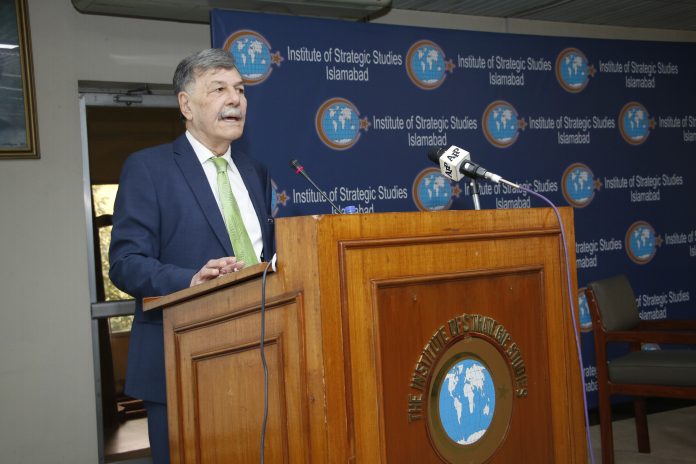Press Release
Public Talk
Climate Change: Energy Strategies for Mitigation
November 26, 2019
“Energy is indispensable for promoting socio-economic development and human welfare, but energy derived from fossil fuels has been recognized as a major driver of climate change – something which is accepted as a defining challenge of our age.” This was stated by Amb. (Retd) Shafqat Kakakhel, former United Nations Assistant Secretary General UN Environment Programme (UNEP), during his address at a Public Talk on ‘Climate Change: Energy Strategies for Mitigation’. The event was organized by the Institute of Strategic Studies Islamabad (ISSI) today under its Distinguished Lecture Series. Policy makers, diplomats, academics and students were present on the occasion.
During his remarks, Ambassador Kakakhel gave an overview of Pakistan’s energy needs. He said that the demand for power is expected to grow by 9% annually, which will result in the gradual depletion of non-renewable sources such as gas wells, which necessitates formulating responses to meet demands. He spoke of Pakistan’s vulnerability to climate change and pointed out that one of the problems Pakistan faces is because of overall governance challenges and poorly resourced disaster warning and preparedness system, especially at the provincial and lower levels of government.
He also spoke about Pakistan’s climate change agenda and said that Pakistan is acutely vulnerable to the impacts of climate change. He said that Pakistan needs to make determined efforts to promote domestic manufacturing of alternative and renewable energy equipment such as small hydro power generators, solar PV panels, and wind energy turbines in order to reduce cost of imported equipment which has impeded the growth of carbon-less energy thus far. The announcement of the new Alternative and Renewable Policy (AREP) on November 20, 2019 was a significant landmark in the development and deployment of renewable energy in Pakistan. However, given Pakistan’s record of delayed implementation of policies, it is hoped that given the urgency of the subject, the government will make all required efforts to implement this policy, he said.
Earlier, in his welcome remarks, Ambassador Aizaz Ahmad Chaudhry, Director General ISSI, said that Pakistan has rightly supported and engaged with international efforts to mitigate impacts of climate change. However, there are indicators which show that it will now be nearly impossible to meet the Paris Agreement targets, which means that developing countries like Pakistan will have to bear the bulk of the burden of adaptation itself. “Mitigating the impacts of climate change is one side of the story, living with the impacts is another and ignoring the impacts of climate change is no longer an option,” he said.
Ambassador Khalid Mahmood, Chairman BOG, ISSI, in his concluding remarks stated that even though climate change is a relatively new subject, it is a very multidimensional issue. He noted that the Paris Agreement provides a very forward looking plan of action and it is important that it is adhered to. A wholesome approach at all levels in line with the sustainable development goals is the need of the hour, he said.












